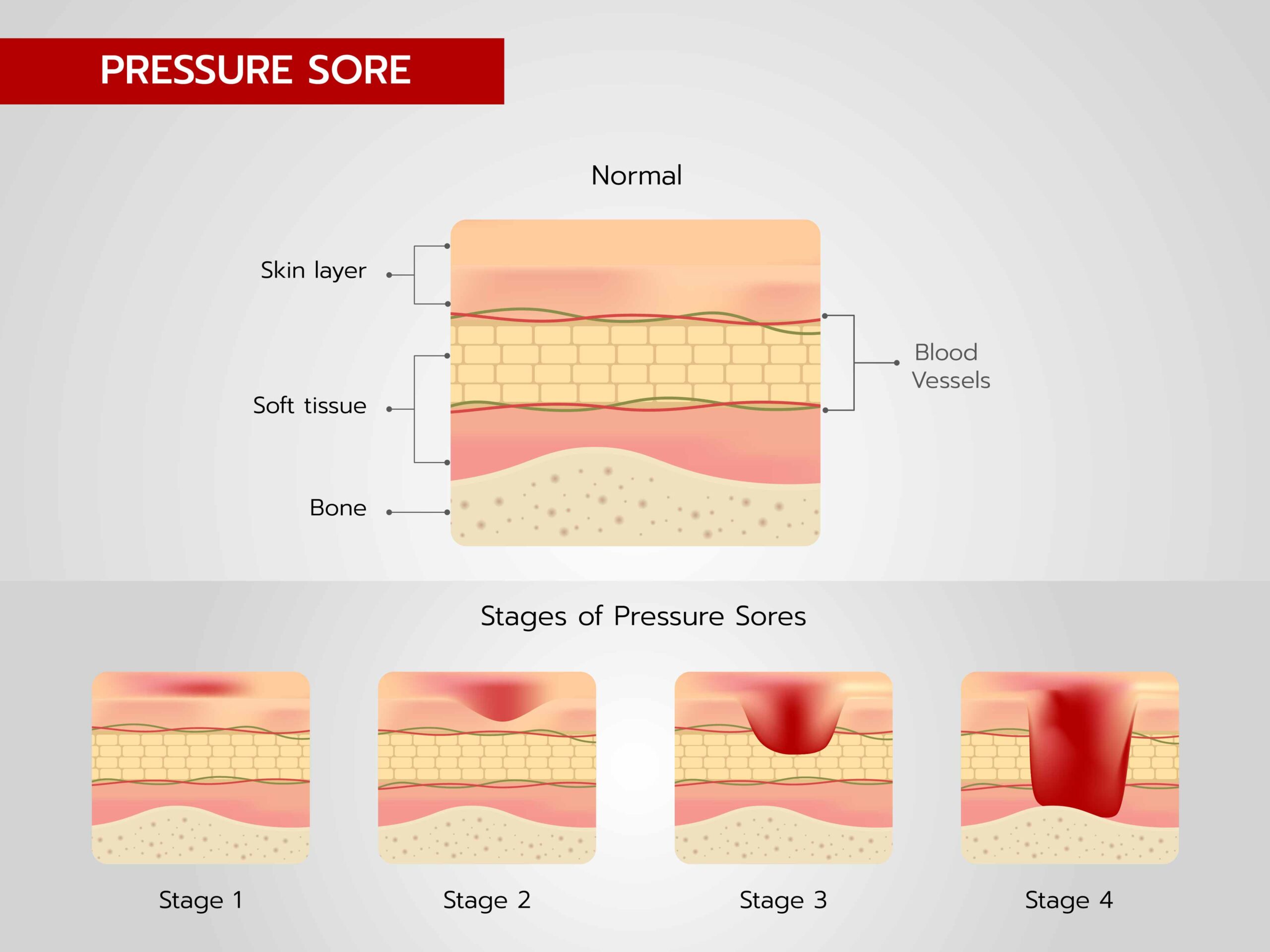Bedsores, also known as pressure sores or pressure injuries, are areas of damage to the skin and underlying tissues caused by prolonged pressure and friction. These painful sores usually occur in people who are unable to move regularly, such as those who are bedridden, wheelchair-bound, or have limited mobility due to illness or injury.
Bedsores often develop on bony areas of the body, such as the hips, tailbone, heels, ankles, and elbows. They can range in severity from mild redness and irritation to deep wounds that extend into the muscle and bone. If left untreated, bedsores can lead to serious complications, including infection, sepsis, and even death.
Many factors can contribute to the development of bedsores, including friction, shearing forces, moisture, poor nutrition, and medical conditions that affect circulation, such as diabetes and vascular disease. The risk of developing bedsores can be reduced by taking preventive measures, such as repositioning the person frequently, using specialized cushions and mattresses, and keeping the skin clean and dry.
If a bedsore does develop, prompt treatment is essential to prevent further damage and promote healing. Treatment may include cleaning the wound, removing dead tissue, applying dressings, and use of antibiotics. In severe cases, surgery may be necessary to remove damaged tissue or repair underlying structures.
Prevention is key when it comes to bedsores. Caregivers must ensure that those who are bedridden or wheelchair-bound are repositioned frequently and have proper support surfaces and devices. It is important to identify and treat bedsores early to prevent complications and avoid additional pain and suffering. If you or someone you love is at risk for bedsores, talk to your healthcare provider about measures they can take to reduce the risk of developing these painful and potentially dangerous ulcers.
Pressure injuries are the leading cause of nursing home abuse and neglect lawsuits in America. The reason is quite simple – pressure injuries/bedsores are avoidable if the nursing home simply provides the minimum standard of care. Turning and repositioning residents that cannot turn and reposition themselves is not complex medicine. It is simple care that requires time and consistency. The reason pressure injuries occur in nursing homes is also quite simple. The vast majority of nursing homes are a “for profit” business. This means that they are not trying to provide the best possible care to their “customers”. What they are actually trying to do is provide “just enough” care that nobody gets hurt and they can maximize their profit. At least that is the strategy of the honorable nursing homes! The dishonorable nursing homes actually staff their facilities for maximum profit knowing that some of their residents will undoubtedly be harmed by the lack of care but they know that very few residents or their families will ever seek a lawyer. The best nursing homes are trying to get as close to the line of harming the residents as they can without going over it. The worst nursing homes are intentionally crossing that line and hoping they get away with it. The result is people laying in one position for much longer than they should. People who cannot move themselves sitting in soiled diaper far longer than anyone should be left in a soiled diaper. Skin gets wet. Pressure breaks the skin down. Sores develop. Feces and urine get in the wound. Infection occurs. Infections spreads. Sepsis results. Residents die.

Here is what you should be looking for when you visit your loved one to prevent painful and potentially fatal pressure injuries/bedsores:
Pressure injury prevention is about consistent staff action.
It takes time and consistent effort to prevent pressure injuries but that is what the nursing home is being paid thousands of dollars a month to do!
If your loved one developed a pressure injury while in a nursing home, we can help. With over 25 years of experience dealing with nursing home neglect and abuse cases, the attorneys at Williams DeLoatche know how to hold nursing facility’s accountable for their neglect and abuse. We specialize in making sure that what happened to your loved one doesn’t happen to someone else by making sure the nursing home is held financially accountable for their neglect and abuse of the elderly. The truth is it was a money motive that led to the neglect. The nursing home’s desire to maximize its money leads to understaffing that leads directly to pressure injuries/bedsores. Money is the only thing these facilities and their owners understand. A lawsuit where the nursing home must be forced to pay the family of their neglected residents is the only way real change will ever come to the industry. That is why Williams DeLoatche does this work.
The bottom line is: THIS IS NOT YOUR FAULT! We know that no one really wants to go into a nursing home, but this is often the reality for anyone who can no longer care for themselves. You trusted the nursing home with the care of your loved one and they have betrayed your trust.
Contact us for a FREE case evaluation and we can let you know what your next steps should be.